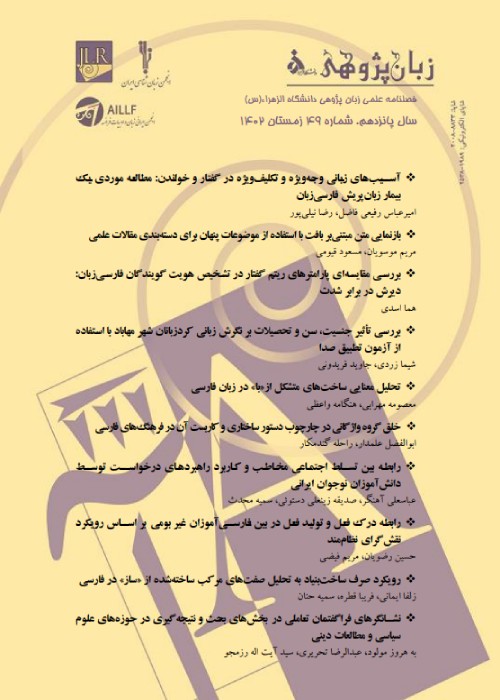A Study of the Effects of Rote, Mnemonic and Contextualized Strategies on Advanced Iranian EFL Learners’ Lexical Development
Author(s):
Article Type:
Research/Original Article (دارای رتبه معتبر)
Abstract:
Language is the sign of mental development and an instrument of understanding. It has a very important role in cognitive and social development. Language is mingled with thought. Thoughts are conveyed through language. Words are the basic units, which construct the spoken and written language. In order to express the ideas, one needs words. Therefore, words and the way of learning them are essential processes for all the speakers of a language. Communication is possible through speaking. However, in order to be a successful communicator, it is necessary to pay attention to all the skills of the language. Learning a foreign language is an essential component in foreign language learners’ lives for the challenges that they face during this process. Most of the challenges posed in this stage are due to the learners’ limited exposure to that language. Vocabulary learning is at the core of language learning. Vocabulary Learning Strategies (VLS) facilitate this process. The present study aimed to investigate three common types of vocabulary learning strategies, including rote memorization, mnemonic memorization, and contextualized memorization used by advanced Iranian EFL learners. The design of this study was quasi-experimental. It consisted of three experimental groups and one control group. A website was designed by the researchers for the sake of this study. The website helped the researchers in the process of scoring and reduced the probability of cheating among the participants, so it increased the reliability of the study. Some eighty advanced female Iranian learners (20 in each group) participated in this study. The participants were selected according to the results of the Quick Placement Test. The advanced level learners were chosen on the basis of convenient sampling. At the beginning, a pretest was administered to the learners. Approximately one hundred and fifty words were selected from the book named “Borron’s Essential Words for the TOEFL”. The words were taught to the learners in fifty sessions by three different
methods
rote, mnemonic and contextualized. The teacher was one of the researchers. There were also immediate and delayed posttests at the end; however, the immediate and delayed posttests were different in the order of the questions and choices. The results were analyzed by SPSS software. A one-way ANOVA was conducted. In terms of inferential statistics, this study showed that there is a significant difference between the experimental groups and the control group. The mnemonic group was meaningfully better than the contextualized group, the contextualized group outperformed the rote group meaningfully, and finally the rote group had a better performance when compared with the control group. In descriptive terms, the findings of this study showed that those who were taught using the mnemonic strategy had the highest mean in both immediate (M=39.3) and delayed (M=39) posttests, and showed a better performance than the other groups. The findings of the study have some implications for classroom practice. Therefore, this study might have some beneficial pedagogical implications for both teachers and learners by helping them redefine their proper responsibilities. In a broad sense, this study may help teachers to remember that no single L2 instructional methodology fits all learners. Strategies help determine a particular learner’s ability and willingness to work within the framework of various instructional methodologies. It is foolhardy to think that a single L2 methodology could possibly fit an entire class filled with learners who have a range of stylistic and strategic preferences. Instead, the teachers should be aware of different strategies used by learners and apply the most suitable methods. These methods could allow creative variety to meet the needs of all learners in class. The results of the present study can make writers aware of the conventions of their discipline and help teachers to be careful in using different vocabulary learning strategy types to develop vocabulary and to improve reading and writing in a more natural way. The findings of this research can also contribute to the improvement of the ability to understand the language of written academic discourse. In the present study the application of vocabulary learning strategies resulted in successful learning among language learners. It is worth mentioning that applying these strategies are fruitful for both teachers and learners. They can help both groups to be successful in their practices. Also, even less proficient learners and novice teachers can find something interesting. However, syllabus designers and material writers can use the advantages of these vocabulary learning strategies in writing and developing English materials.Keywords:
Language:
Persian
Published:
Language research, Volume:12 Issue: 36, 2020
Pages:
333 to 361
magiran.com/p2207442
دانلود و مطالعه متن این مقاله با یکی از روشهای زیر امکان پذیر است:
اشتراک شخصی
با عضویت و پرداخت آنلاین حق اشتراک یکساله به مبلغ 1,390,000ريال میتوانید 70 عنوان مطلب دانلود کنید!
اشتراک سازمانی
به کتابخانه دانشگاه یا محل کار خود پیشنهاد کنید تا اشتراک سازمانی این پایگاه را برای دسترسی نامحدود همه کاربران به متن مطالب تهیه نمایند!
توجه!
- حق عضویت دریافتی صرف حمایت از نشریات عضو و نگهداری، تکمیل و توسعه مگیران میشود.
- پرداخت حق اشتراک و دانلود مقالات اجازه بازنشر آن در سایر رسانههای چاپی و دیجیتال را به کاربر نمیدهد.
In order to view content subscription is required
Personal subscription
Subscribe magiran.com for 70 € euros via PayPal and download 70 articles during a year.
Organization subscription
Please contact us to subscribe your university or library for unlimited access!


